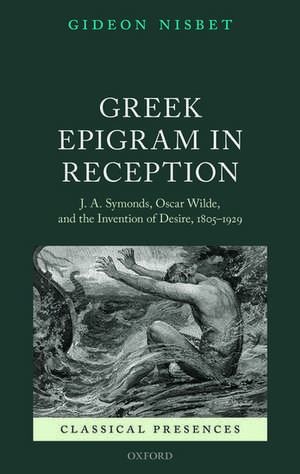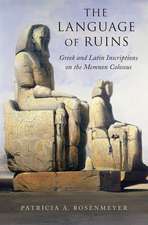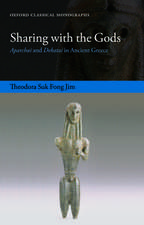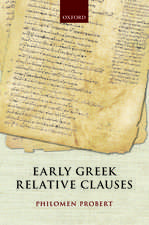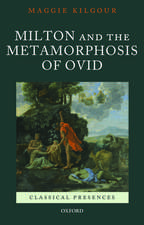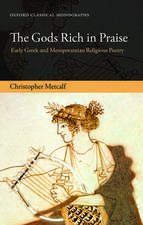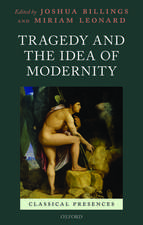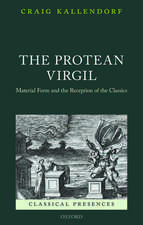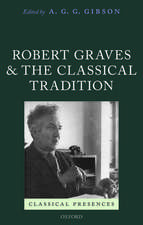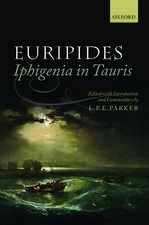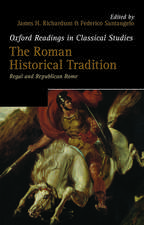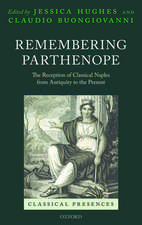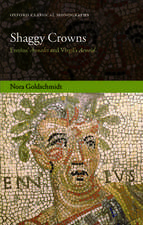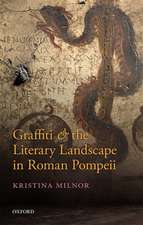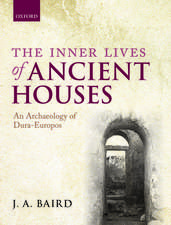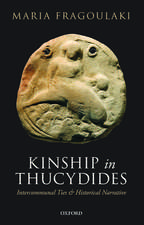Greek Epigram in Reception: J. A. Symonds, Oscar Wilde, and the Invention of Desire, 1805-1929: Classical Presences
Autor Gideon Nisbeten Limba Engleză Hardback – 31 oct 2013
Din seria Classical Presences
- 27%
 Preț: 476.23 lei
Preț: 476.23 lei - 30%
 Preț: 493.26 lei
Preț: 493.26 lei - 30%
 Preț: 501.09 lei
Preț: 501.09 lei - 30%
 Preț: 593.43 lei
Preț: 593.43 lei - 6%
 Preț: 337.35 lei
Preț: 337.35 lei - 30%
 Preț: 540.38 lei
Preț: 540.38 lei - 28%
 Preț: 474.92 lei
Preț: 474.92 lei - 17%
 Preț: 501.92 lei
Preț: 501.92 lei - 13%
 Preț: 226.46 lei
Preț: 226.46 lei - 25%
 Preț: 687.80 lei
Preț: 687.80 lei - 19%
 Preț: 677.96 lei
Preț: 677.96 lei - 30%
 Preț: 821.25 lei
Preț: 821.25 lei - 28%
 Preț: 473.71 lei
Preț: 473.71 lei - 26%
 Preț: 614.24 lei
Preț: 614.24 lei - 17%
 Preț: 582.93 lei
Preț: 582.93 lei - 30%
 Preț: 538.77 lei
Preț: 538.77 lei - 30%
 Preț: 645.95 lei
Preț: 645.95 lei - 30%
 Preț: 501.52 lei
Preț: 501.52 lei - 18%
 Preț: 704.79 lei
Preț: 704.79 lei - 27%
 Preț: 519.88 lei
Preț: 519.88 lei - 16%
 Preț: 706.89 lei
Preț: 706.89 lei - 25%
 Preț: 554.32 lei
Preț: 554.32 lei - 16%
 Preț: 584.68 lei
Preț: 584.68 lei - 30%
 Preț: 562.14 lei
Preț: 562.14 lei - 30%
 Preț: 598.80 lei
Preț: 598.80 lei - 30%
 Preț: 617.54 lei
Preț: 617.54 lei - 25%
 Preț: 612.31 lei
Preț: 612.31 lei - 30%
 Preț: 589.73 lei
Preț: 589.73 lei - 30%
 Preț: 789.84 lei
Preț: 789.84 lei - 30%
 Preț: 600.20 lei
Preț: 600.20 lei - 30%
 Preț: 611.82 lei
Preț: 611.82 lei - 29%
 Preț: 1083.87 lei
Preț: 1083.87 lei - 30%
 Preț: 720.23 lei
Preț: 720.23 lei - 19%
 Preț: 326.97 lei
Preț: 326.97 lei - 26%
 Preț: 760.17 lei
Preț: 760.17 lei - 30%
 Preț: 833.88 lei
Preț: 833.88 lei -
 Preț: 307.88 lei
Preț: 307.88 lei - 28%
 Preț: 446.91 lei
Preț: 446.91 lei - 30%
 Preț: 721.88 lei
Preț: 721.88 lei - 30%
 Preț: 575.88 lei
Preț: 575.88 lei - 30%
 Preț: 598.02 lei
Preț: 598.02 lei - 30%
 Preț: 803.03 lei
Preț: 803.03 lei - 30%
 Preț: 733.67 lei
Preț: 733.67 lei - 30%
 Preț: 701.54 lei
Preț: 701.54 lei - 30%
 Preț: 601.52 lei
Preț: 601.52 lei - 30%
 Preț: 747.48 lei
Preț: 747.48 lei - 30%
 Preț: 556.05 lei
Preț: 556.05 lei - 30%
 Preț: 818.03 lei
Preț: 818.03 lei
Preț: 614.67 lei
Preț vechi: 880.77 lei
-30% Nou
Puncte Express: 922
Preț estimativ în valută:
117.61€ • 123.24$ • 97.23£
117.61€ • 123.24$ • 97.23£
Carte tipărită la comandă
Livrare economică 01-07 aprilie
Preluare comenzi: 021 569.72.76
Specificații
ISBN-13: 9780199662494
ISBN-10: 0199662495
Pagini: 398
Dimensiuni: 144 x 224 x 27 mm
Greutate: 0.61 kg
Editura: OUP OXFORD
Colecția OUP Oxford
Seria Classical Presences
Locul publicării:Oxford, United Kingdom
ISBN-10: 0199662495
Pagini: 398
Dimensiuni: 144 x 224 x 27 mm
Greutate: 0.61 kg
Editura: OUP OXFORD
Colecția OUP Oxford
Seria Classical Presences
Locul publicării:Oxford, United Kingdom
Recenzii
Nisbet's book makes a significant contribution to our understanding of the discipline of classics and its Victorian flourishing.
Notă biografică
Gideon Nisbet is a Reader in Classics at the University of Birmingham. He is known for his publications in ancient epigram and the reception of classical Greece and Rome in modern culture.
